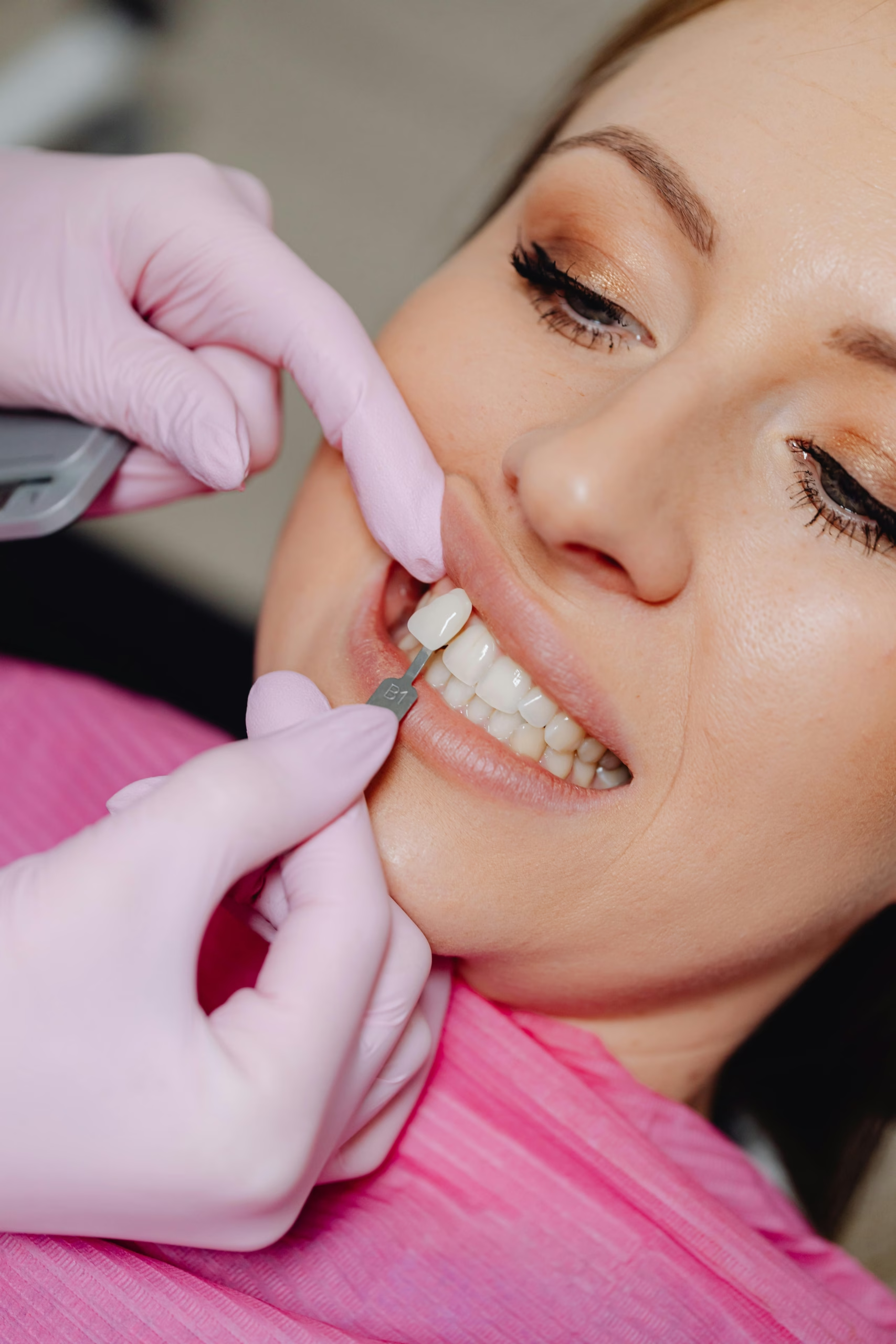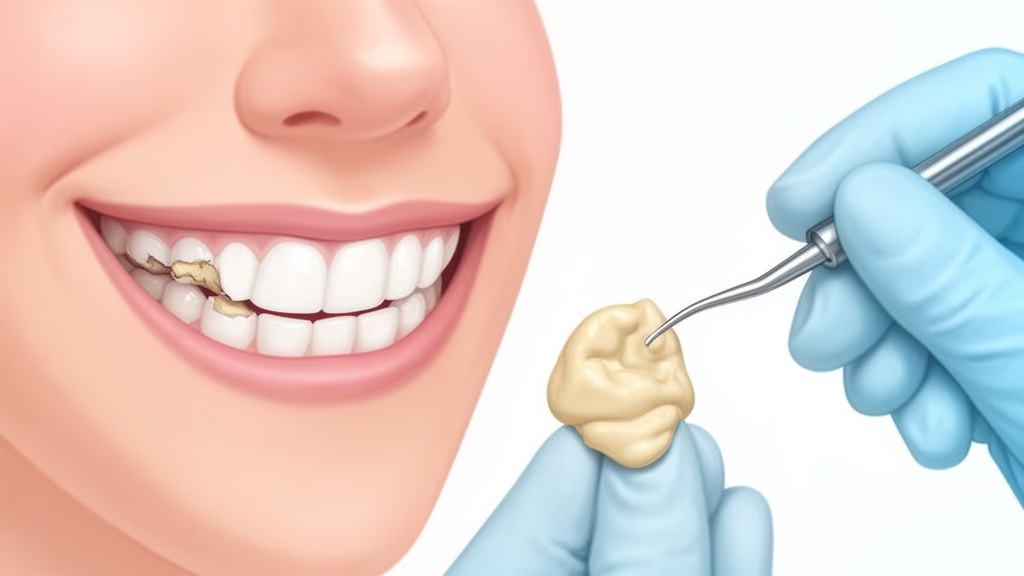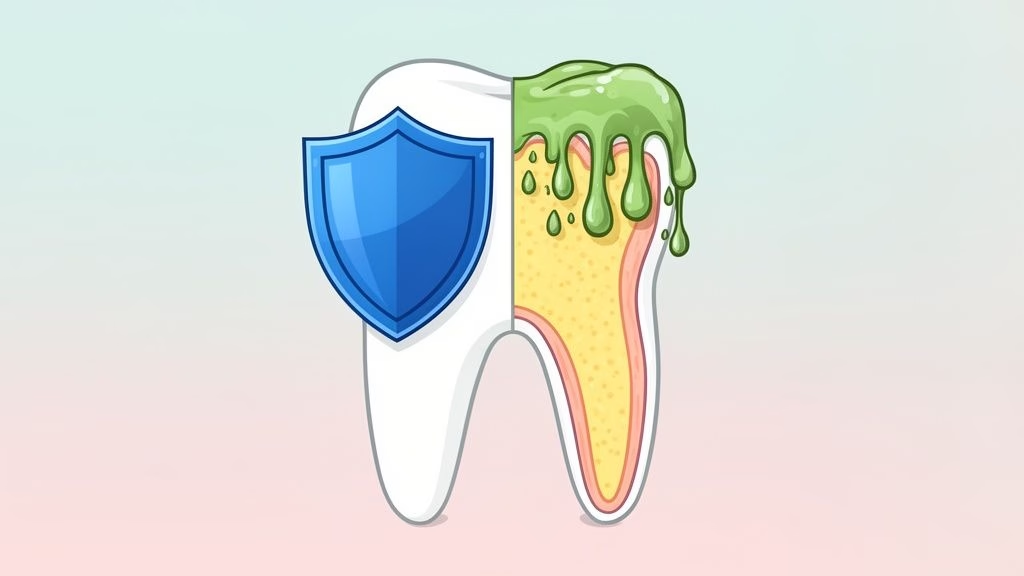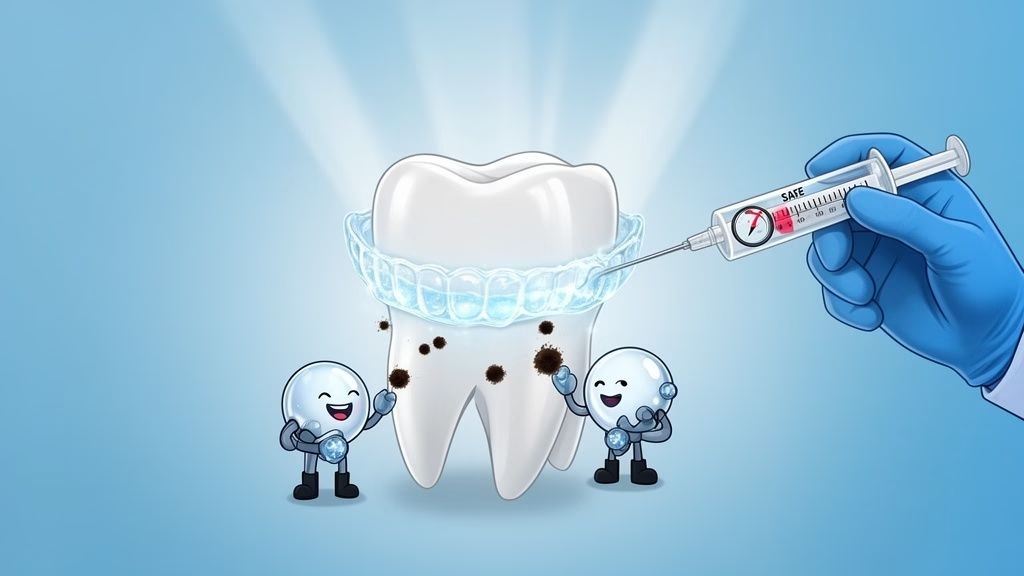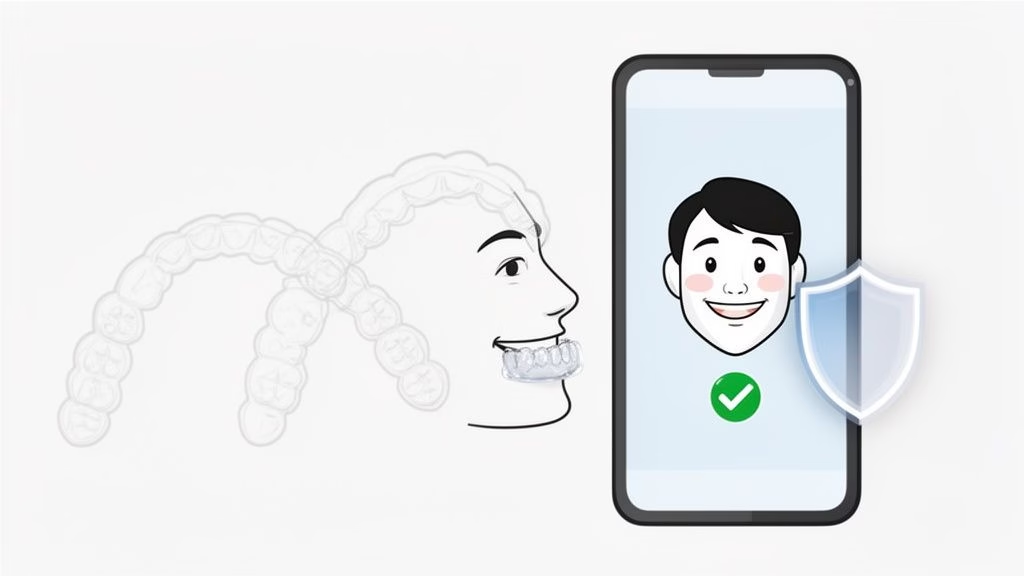How to Treat Canker Sores Fast
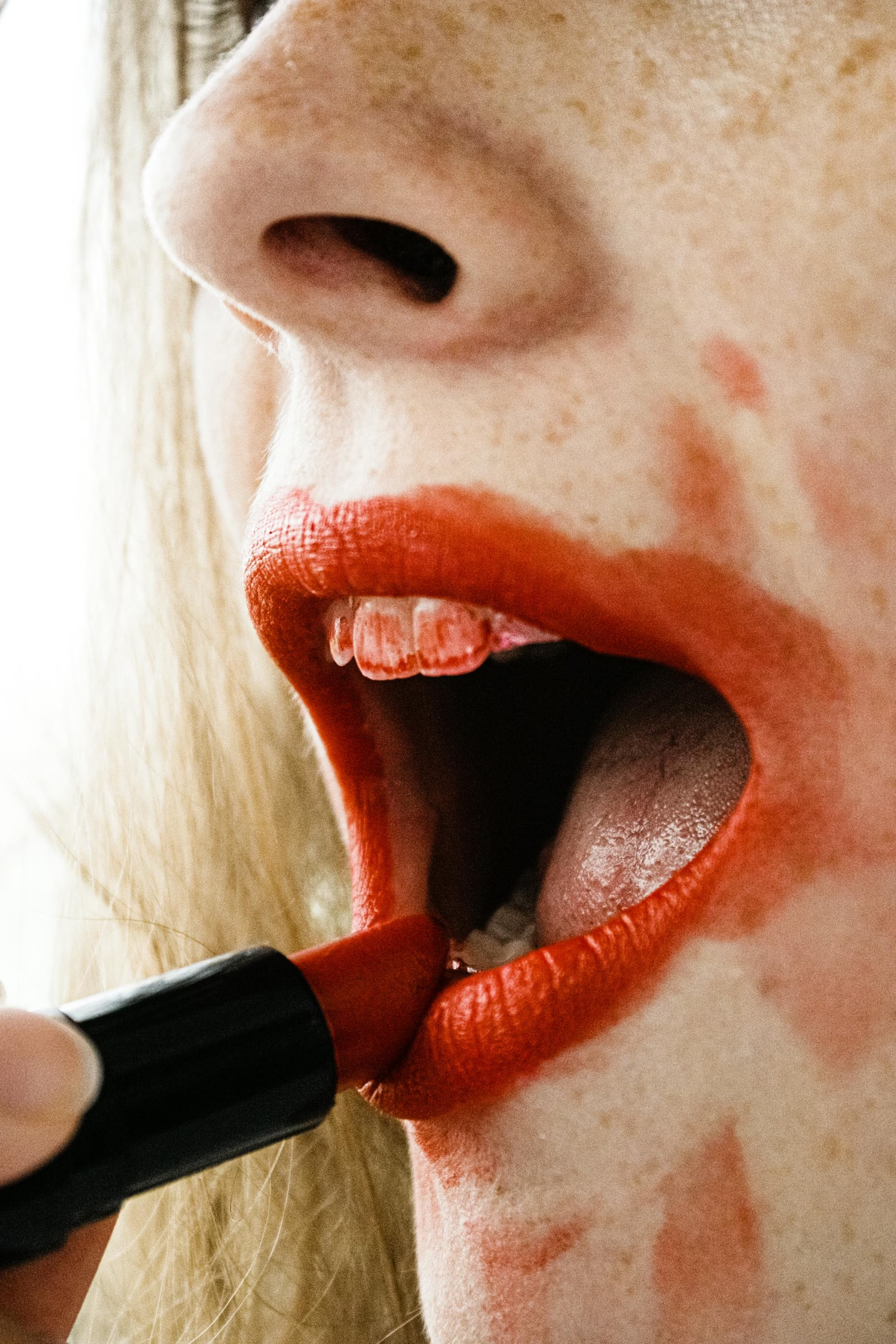
When it comes to treating canker sores, the best approach is often a mix of at-home care and understanding what causes them in the first place. These small but mighty painful ulcers can usually be managed without a trip to the dentist, but figuring out your personal triggers is the real secret to keeping them from coming back.
What Canker Sores Are and Why You Get Them
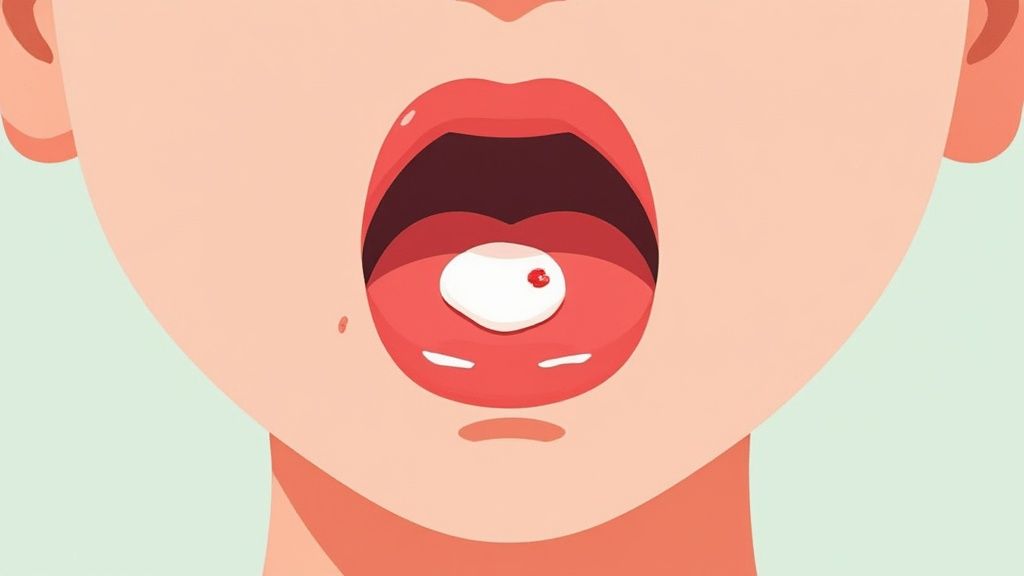
A canker sore—or an aphthous ulcer if you want the clinical term—is a small, shallow sore that pops up on the soft tissues inside your mouth. You’ll usually spot them on your inner lips, cheeks, or tongue. They look like a white or yellowish oval with a very distinct red halo around them.
The good news? They aren’t contagious, so you don’t have to worry about passing them on like you would with a cold sore. The bad news is they can make life miserable, turning simple things like eating, drinking, and even talking into a painful ordeal. If you’ve ever had one, you know exactly what I mean.
Common Triggers Behind Canker Sores
There’s no single cause for canker sores, which can be frustrating. Instead, they’re usually sparked by a combination of factors that are different for everyone. Pinpointing what sets them off for you is the first and most important step towards preventing them.
Here are some of the usual suspects I see in my practice:
- Minor Mouth Injuries: It’s amazing how something so small can cause such a problem. A slip of the toothbrush, an accidental cheek bite while you’re eating, or even a rough edge on dental work like braces can be all it takes to start a sore.
- Stress and Fatigue: I hear this one all the time. Many people find a direct link between a stressful week at work or a period of exhaustion and a sudden canker sore outbreak.
- Dietary Factors: What you eat can definitely play a role. For some people, highly acidic foods like citrus fruits and tomatoes are a major trigger. For others, it might be spicy crisps or even certain nuts.
- Hormonal Changes: Some women notice that sores tend to appear in sync with their menstrual cycle, pointing to hormonal fluctuations as a likely culprit.
The Prevalence in the United Kingdom
If you’re dealing with canker sores, you are far from alone here in the UK. They are an incredibly common oral health issue.
In fact, one study on recurrent aphthous stomatitis (RAS) found that nearly half (47.2%) of people surveyed in the UK had experienced canker sores in the last six months alone. The research drew clear lines between things like oral trauma, stress, and even certain toothpaste ingredients and the likelihood of getting these ulcers. You can read more about the findings on UK canker sore prevalence for the full picture.
This just goes to show that if you’re struggling with recurring mouth ulcers, you are part of a very large group. Knowing the triggers is empowering because it gives you a way to fight back and minimise future flare-ups.
Think about it—if you consistently get a sore after a particularly stressful project at work or after indulging in a curry, you can start making small, targeted changes. Becoming a bit of a detective about these patterns is the best way to manage them and reduce how often you have to put up with the discomfort.
Finding Immediate Relief with At-Home Remedies
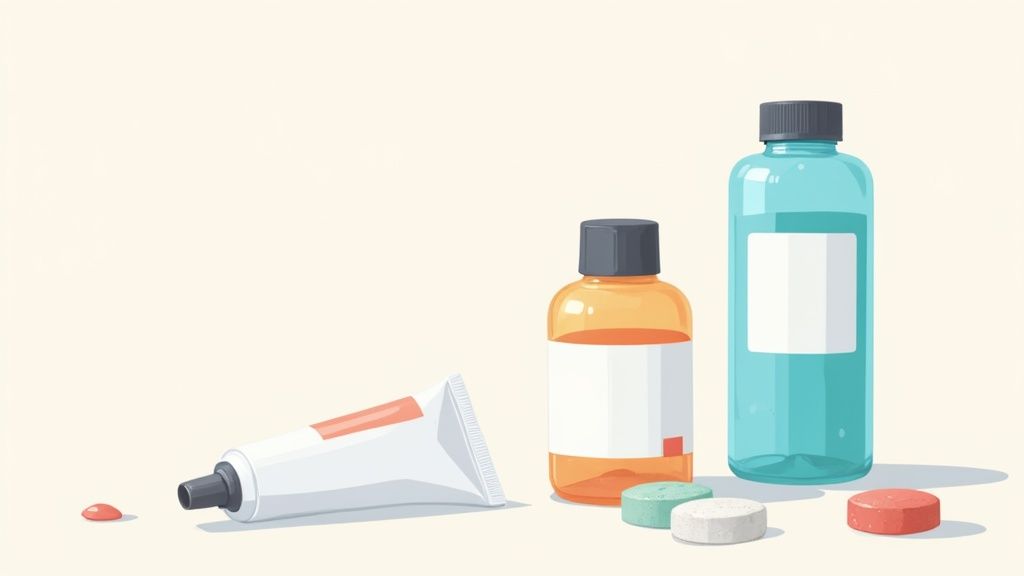
When a canker sore pops up, that sharp, stinging pain is impossible to ignore. The good news is, you probably don’t need to make a special trip to the chemist to get some relief. More often than not, some of the best first-line treatments for a canker sore are waiting in your kitchen cupboards.
These simple home remedies are all about cleaning the sore, calming the inflammation, and shielding it from further aggravation. They’re safe, easy to find, and can make a world of difference when it comes to talking and eating without wincing.
The Classic Saltwater Rinse
There’s a reason the saltwater rinse has been passed down through generations—it’s simple, and it works. Salt acts as a gentle, natural antiseptic. It helps to draw out fluid from the sore, which eases swelling and keeps the area clean.
Making it is as straightforward as it gets:
- Mix your solution: Just dissolve half a teaspoon of regular table salt into a small glass of warm water.
- Swish gently: Take a mouthful and carefully swish it around for about 30 seconds. Make sure it flows over the sore.
- Repeat often: You can do this a few times a day, particularly after meals, to keep things clean and aid the healing process.
This simple act temporarily changes the pH balance inside your mouth, making it a much less friendly place for bacteria to hang out.
Other Soothing Kitchen Cupboard Solutions
Salt isn’t your only ally. A few other common household items can offer real comfort when a canker sore is making you miserable. These work in different ways, either by coating the ulcer for protection or using natural compounds to bring down the inflammation.
For instance, dabbing a tiny bit of milk of magnesia directly onto the sore can form a protective layer. Think of it as a temporary plaster that shields the ulcer from irritating foods, drinks, or even just your tongue.
Some people also swear by applying a black tea bag directly to the ulcer. Black tea is rich in tannins, which are astringent compounds that can help dry out the sore and dull the pain. Just dampen a tea bag and press it gently against the sore for a few minutes.
Remember, the goal of at-home care is to manage discomfort and create a clean environment for healing. These remedies won’t make a canker sore disappear overnight, but they can dramatically reduce pain and speed up the natural healing process.
If you happen to wear dental aligners, whether from Toothfairy or another brand, keeping your mouth extra clean is non-negotiable. A saltwater rinse becomes even more valuable here, helping to ensure no stray food particles get trapped and make the irritation worse.
What to Grab at the Chemist: Over-the-Counter Canker Sore Solutions
If you’ve tried the saltwater rinse and it’s just not doing the trick, it’s probably time for a trip to the local chemist. They have a whole arsenal of over-the-counter (OTC) products specifically designed to tackle canker sores. These aren’t just about dulling the pain; they’re formulated to create a protective barrier that really helps speed up healing.
Walking down the aisle, the sheer number of options can be a bit much. But it’s simpler when you break it down. You’re essentially looking for something that can numb the sting and shield the sore from getting bumped or irritated by food and drink. That’s the key to letting it heal in peace.
Before you even head to the shop, some basic at-home care can make a huge difference.
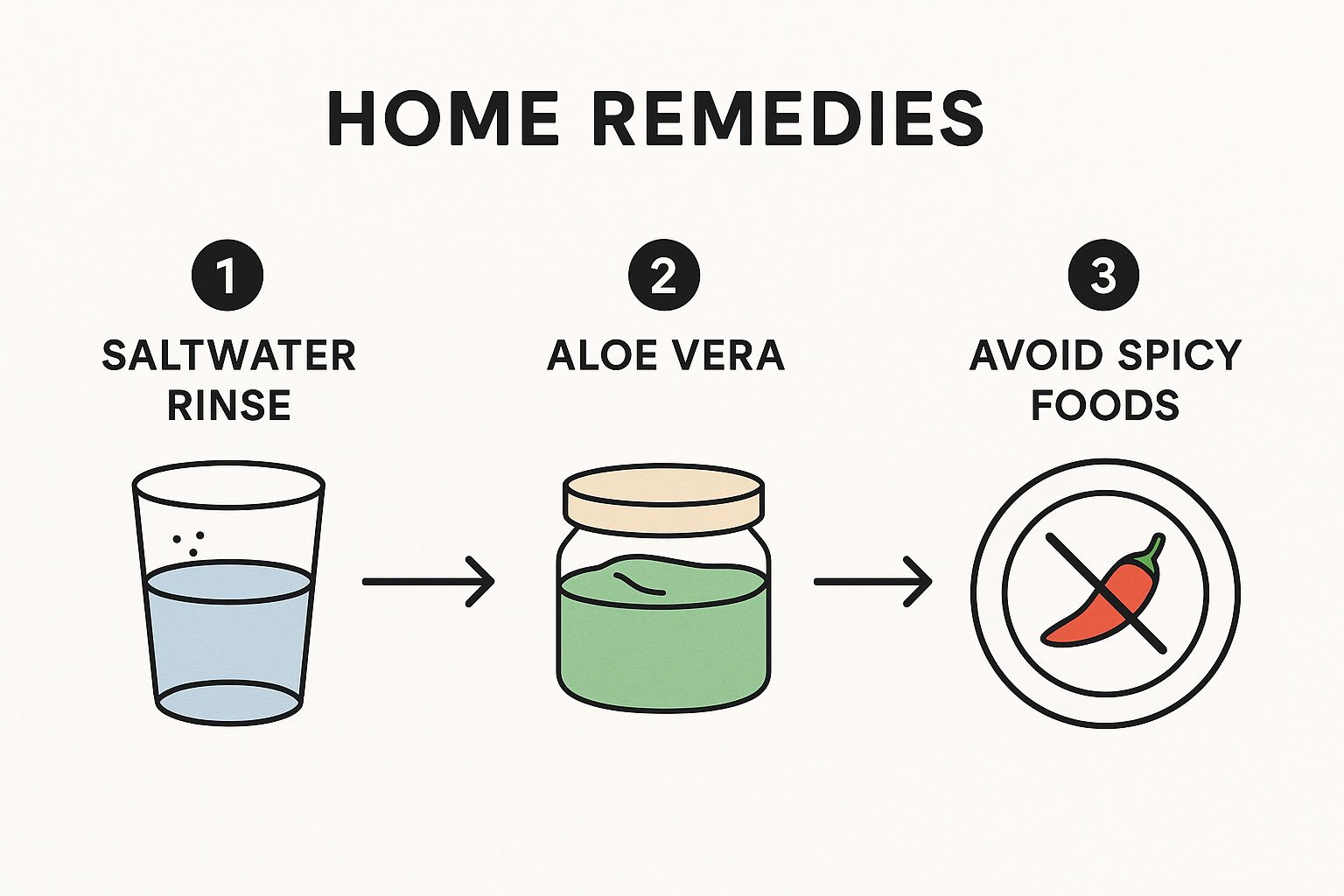
This just gives you a quick visual reminder of the basics: keep it clean, be gentle, and steer clear of anything that makes it flare up.
Topical Gels and Pastes for Pinpoint Relief
For direct, on-the-spot relief, you can’t beat a good topical gel or paste. You apply these right onto the ulcer, and many contain a mild local anaesthetic like lidocaine or benzocaine. The numbing effect is almost immediate, which is an absolute godsend when you’re trying to eat or drink.
Some products work a bit differently, forming a thin, protective film over the sore. Think of it as a tiny, invisible plaster. This is brilliant if your sore is in an awkward spot that keeps getting rubbed, like against a tooth or a brace.
Medicated Mouthwashes for Wider Coverage
Got more than one sore? Or one that’s tucked away at the back of your mouth? Trying to dab a gel on can be a real pain. This is where a medicated mouthwash comes in handy. These rinses are great for covering a larger area and often have antiseptic ingredients that help prevent the sore from getting infected, which is a common reason for slow healing.
Look for active ingredients like chlorhexidine gluconate. It’s very effective, but it’s really meant for short-term use—be sure to read the instructions on the bottle, as overuse can sometimes lead to temporary tooth staining.
A Pro Tip: For gels and pastes to work their magic, the area needs to be dry. Gently dab the sore with a clean tissue before you apply anything. This little step helps the product stick properly and create that all-important protective seal.
When you’re browsing the shelves, it helps to know what you’re looking for. Here’s a quick breakdown of the most common options you’ll find in the UK.
Comparing Over-the-Counter Canker Sore Treatments
This table compares common OTC canker sore treatments available in the UK, highlighting their primary function, how they work, and ideal use cases to help you choose the best option.
| Treatment Type | Primary Function | How It Works | Best For |
|---|---|---|---|
| Anaesthetic Gels | Pain Relief | Contains a topical anaesthetic (e.g., lidocaine) to numb the sore on contact. | Immediate, short-term relief, especially before eating. |
| Protective Pastes | Barrier Formation | Creates a physical film over the sore to shield it from irritation. | Sores in high-friction areas; provides lasting protection. |
| Antiseptic Mouthwash | Infection Prevention | Kills bacteria in the mouth to keep the ulcer clean and promote healing. | Multiple sores or hard-to-reach ulcers. |
| Dissolving Patches | Shielding & Medication | A small patch sticks over the sore, delivering medication and acting as a barrier. | Single, well-defined sores; ideal for overnight use to heal undisturbed. |
Each of these has its place, and sometimes a combination works best—like using a mouthwash in the morning and a gel for targeted relief during the day.
Canker Sore Patches: The New Kid on the Block
You might also spot some newer products on the market: small, dissolving patches or films. These are pretty clever. You stick one directly over the canker sore, and it stays put for hours, slowly releasing medication while forming a robust shield.
- How do they work? By completely covering the nerve endings, they block irritation from air, food, and drink, which is what causes most of the pain.
- When are they best? They’re perfect for single, easy-to-see sores. Pop one on before bed, and it can work its magic all night long without you even noticing.
If you’ve tried a few OTC options and you’re still not getting relief, or if the sore is particularly large or just won’t go away, it’s a good idea to get a professional opinion. For those times when you need advice quickly, the Toothfairy app is a fantastic resource. As a smarter, more affordable way to access care for dental emergencies, it connects you directly to a UK-registered dentist for a video consultation, so you can get personalised advice without leaving home.
The Long Game: Preventing Canker Sores with Lifestyle Tweaks
Once you’ve soothed an active canker sore, the real goal is to stop the next one from ever showing up. This is where a few smart adjustments to your daily life can make all the difference. The most powerful way to break the cycle of recurring mouth ulcers is to figure out what’s triggering them for you.
It’s rarely just one thing. More often, it’s a mix of factors—your diet, stress levels, even the toothpaste you use. By getting on the front foot, you can drastically cut down on how often you have to put up with these painful spots.
Tame Your Stress
There’s a direct, undeniable link between your mind and your mouth. Stress is a massive trigger for canker sores, and it’s something that affects about 20% of the UK population at some stage. While stress doesn’t literally create an ulcer, it’s often the spark that sets off a flare-up in people who are already prone to them.
Ever noticed a sore appearing during a frantic week at work or a difficult time at home? That’s not a coincidence. If an ulcer sticks around for too long, it’s always worth getting it checked, a point reinforced when you learn more about the state of mouth cancer and oral health awareness in the UK.
Finding healthy outlets for stress is key. This doesn’t have to be complicated:
- Mindfulness and Meditation: Just a few minutes of quiet breathing exercises can genuinely lower your stress hormones.
- Get Moving: A brisk walk, a good gym session, or a yoga class are all fantastic for working off tension.
- Protect Your Sleep: Good quality sleep is the foundation of a resilient immune system and a calmer mind.
Rethink What’s on Your Plate
The food you eat can either be a friend or a foe to the inside of your mouth. Pinpointing and avoiding your personal food triggers is one of the most effective preventative steps you can take.
The usual suspects are highly acidic or spicy foods. Think about easing up on citrus fruits, tomatoes, fiery curries, and sharp-flavoured crisps, particularly if you feel that tell-tale tingle of a new sore. For some, even things like nuts or chocolate can be the culprit. A simple trick is to keep a food diary for a couple of weeks—you might be surprised by the patterns you uncover.
Nutritional gaps can also be a factor, so it’s worth understanding vitamin and mineral deficiencies to see if that’s part of the puzzle. A lack of iron, zinc, or certain B vitamins has been linked to recurring ulcers.
Paying attention to how your body reacts to different foods isn’t about restriction; it’s about empowerment. Knowing your triggers gives you control over your oral health, allowing you to make smarter choices that prevent discomfort before it starts.
Fine-Tune Your Oral Hygiene
How you look after your teeth and gums can play a bigger role than you might think. Brushing too aggressively can create tiny scrapes in the delicate lining of your mouth—the perfect invitation for a canker sore to move in.
Make the switch to a toothbrush with soft bristles and focus on gentle, circular motions rather than hard back-and-forth scrubbing. This is especially important if you’re using clear aligners for orthodontic treatment, as your gums can be more sensitive. While some aligner systems demand meticulous hygiene, Toothfairy offers a smarter and more affordable way to straighten teeth, with a dentist-led approach ensuring you always get personalised advice on keeping your mouth healthy throughout your journey.
Here’s another simple but powerful change: check your toothpaste ingredients. Many popular brands contain sodium lauryl sulphate (SLS), a foaming agent known to irritate sensitive mouths and trigger canker sores. You can find plenty of SLS-free options at your local chemist. For many people, this one small swap is a complete game-changer.
Most of the time, canker sores are just one of life’s little annoyances—they show up, make eating a bit miserable for a week or so, and then disappear. But every now and then, a sore might stick around a little too long or hurt a lot more than usual. That’s your cue to stop the home remedies and get a professional opinion.
Knowing when to call in a dentist is really about spotting the difference between a minor blip and something that needs a proper look. Think of it this way: a typical canker sore is a small, passing storm. If that storm turns into something bigger—unusually large, intensely painful, or just refusing to clear up—it’s time for backup. A dentist can rule out any underlying issues and offer treatments that are far more effective than anything you can grab from the chemist’s shelf.
Red Flags That Signal a Dental Visit
So, what are the warning signs? There are a few key things to watch for that should prompt you to book an appointment. Don’t just brush them off as a “bad canker sore.”
It’s time to see a dentist if you’re dealing with any of these:
- Sores that won’t quit: A normal canker sore is usually gone within about two weeks. If you have an ulcer that’s still hanging around for three weeks or longer, it absolutely needs to be checked.
- Unusually large or deep sores: Most ulcers are small and relatively shallow. If you notice a sore that’s particularly large or seems deeper than usual, it’s worth getting it looked at.
- Constant recurrences: Are you in a frustrating cycle where as soon as one sore heals, another one pops up? That constant merry-go-round isn’t normal and needs investigating.
- Pain you can’t manage: If the pain is so bad that you can’t eat, drink, or even talk properly, and over-the-counter gels just aren’t touching it, a dentist can offer much-needed relief.
- Other symptoms tag along: When a mouth ulcer comes with friends like a fever, a rash, or you just feel generally unwell, it could be a sign of a wider issue that needs attention.
How a Dentist Can Help
When you visit a dentist for a troublesome canker sore, they’ll do much more than just have a quick glance. They’ll carry out a full oral examination to get to the root of the problem. This usually involves a chat about your medical history, your diet, and even your stress levels to piece together what might be triggering them.
Depending on what they find, they can prescribe stronger, more targeted treatments. This could be anything from a prescription-strength antimicrobial mouthwash to keep infection at bay, or a corticosteroid ointment that can dramatically reduce the pain and inflammation. For really severe cases, they might even consider oral medications.
Remember, a dentist’s role here is as much about diagnosis as it is about treatment. They have the expertise to distinguish a simple ulcer from something more serious, giving you both an effective solution and peace of mind.
The Future of Canker Sore Treatment
The good news is that we’re learning more about these painful ulcers all the time. Exciting new research from the UK has pinpointed 97 genetic variations linked to why some people are more prone to them. These discoveries are really shining a light on the immune system’s role and paving the way for targeted therapies that could be a game-changer. You can read up on the genetic insights into canker sore treatment to see what’s on the horizon.
But what about right now? If you need advice quickly without having to leave your home, help is at your fingertips. The Toothfairy app lets you have an emergency video consultation with a UK-registered dentist. It’s a smart, affordable way to get an expert opinion on your canker sore fast, making sure you get the right advice exactly when you need it.
Got Questions About Canker Sores? We’ve Got Answers
Even with all the tips on treatment and prevention, it’s completely normal to still have a few questions buzzing around. Canker sores can be a bit of a mystery, so let’s clear up some of the most common queries I hear from patients.
Are Canker Sores Contagious?
This is a big one, and I can give you a clear and simple answer: absolutely not. Canker sores (their official name is aphthous ulcers) aren’t caused by a virus and you can’t pass them on. Kissing, sharing a cup of tea, none of it will spread a canker sore.
People often get them confused with cold sores, which are caused by the herpes simplex virus and are definitely contagious. Think of a canker sore as an internal inflammatory hiccup, often kicked off by things like stress, a small injury inside your mouth, or something you ate. So, you can relax on that front.
How Long Do These Things Stick Around?
How long a canker sore decides to be a nuisance really depends on which type you’re dealing with. They generally fall into one of three buckets.
- Minor Canker Sores: These are the ones most of us get. They’re small, sort of oval-shaped, and usually clear up on their own within one to two weeks. The best part? No scarring.
- Major Canker Sores: Thankfully less common, these are the more dramatic relatives. They’re bigger, deeper, and often have wonky, irregular edges. They can be seriously painful and sometimes take a good six weeks to heal, occasionally leaving a small scar behind.
- Herpetiform Canker Sores: This type is pretty rare and looks like a cluster of tiny pinprick sores that band together to form one larger ulcer. Don’t let the name fool you—they have zero connection to the herpes virus. They typically heal up within a couple of weeks.
Can Certain Foods Really Cause Canker Sores?
Yes, for a lot of people, diet is a huge trigger. It’s not that a piece of fruit will magically create a sore, but certain foods can definitely provoke an outbreak if you’re already prone to them.
The usual suspects are highly acidic or spicy things. We’re talking citrus fruits like oranges and lemons, tomatoes, pineapple, and even spicy crisps or curries. For some, it’s more about texture—sharp, abrasive foods like crusty bread or certain nuts can cause tiny micro-cuts in the mouth, creating the perfect entry point for an ulcer.
If you think food might be your trigger, try keeping a simple food diary for a few weeks. Just jot down what you eat and when a sore pops up. You might be surprised to find a clear pattern, which is the first step in learning how to stop them before they even start.
Do Clear Aligners Make Canker Sores Worse?
Anything new in your mouth, whether it’s traditional braces or clear aligners from brands like a specific aligner brand or Toothfairy, can cause a bit of irritation at first. It’s not uncommon for the edge of a new aligner to rub against your cheek or inner lip, which can sometimes lead to a canker sore.
The good news is that this is almost always a temporary phase while your mouth gets used to its new resident. At Toothfairy, our entire process is guided by dentists to make sure your aligners fit as comfortably as possible. Plus, our team is always ready to give you tips on managing any initial rubbing, so your path to a straighter smile stays smooth.
Don’t let a dental worry throw off your day. With the Toothfairy app, you can jump on a video call with a UK-registered dentist for an emergency consultation, have prescriptions sent straight to your local pharmacy, or even begin your journey to a straighter smile or other cosmetic dental work. It’s smarter, more affordable dental care, right from your sofa.
Find out more at https://www.toothfairyapp.co.uk
Last updated on October 13, 2025

Toothfairy Care Team
Toothfairy, is the world's smartest dental app, that connects patients to a dentist for a range of issues, from emergencies, cosmetics, prescriptions to virtual exams.
Toothfairy Care Team
Toothfairy, is the world's smartest dental app, that connects patients to a dentist for a range of issues, from emergencies, cosmetics, prescriptions to virtual exams.
